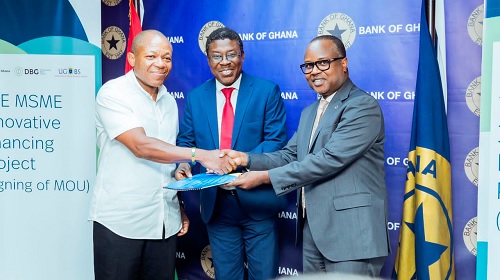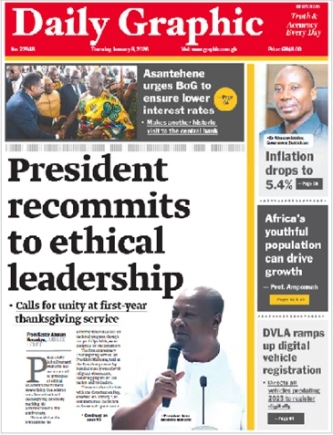
3 Institutions commission study on innovative financing for MSME
Three institutions have signed a memorandum of understanding (MoU) to commission a study on innovative financing for micro, small and medium enterprises (MSMEs) in the country.
The three institutions are the Bank of Ghana (BoG), the Development Bank Ghana (DBG) and the University of Ghana Business School (UGBS).
The study is expected to promote understanding of MSME financing, and also provide anecdotal evidence on the financing challenges that MSMEs face in Ghana, the funding gap that currently exists and to also recommend new and innovative ways of closing the funding gap.
It is also to provide a reliable document which will inform policy to encourage innovation in financing for MSMEs, and consequently create employment and spur economic growth.
At the signing of the MoU, the Second Deputy Governor of the BoG, Dr Maxwell Opoku-Afari, said credit was critical for every economy, particularly developing economies such as Ghana.
He said both theory and empirical literature pointed to the nexus between credit and economic growth, adding that as a central bank, although price stability remained its primary mandate under the inflation targeting framework, economic growth, through credit expansion, was also of key concern.
He said that was why a major consideration was given to the impact of policies on the real sector.
“For instance, much of the reforms that have been initiated within the banking sector, in particular, have been geared towards creating sound, stable, well-capitalised and profitable institutions capable of supporting the real sector and economic growth through increased lending,” he explained.
The Chief Economist of DBG, Dr Kwabena Opuni-Frimpong, said the collaboration could not have come at a better time, considering the huge impact of MSMEs on the economy.
He reiterated that MSMEs were the back bone of the economy and a critical driver of gross domestic product (GDP) growth, providing significant employment to the youth and women.
“They are, however, plagued with financing challenges, and this was why the DBG was set up to complement efforts by the financial sector to provide long-term financing for the private sector.
“It is crucial for all stakeholders to work together to support the development and adoption of innovative financing solutions for MSMEs,” he stated.
Innovative financing
The Project Lead, Professor Eric Osei Assibey, said over the last couple of years, the MSME sector had not been doing well, largely due to the lack of access to sustainable finance and long-term financing.
He said what the sector needed was financing that was tailored to the needs of the MSMEs to help them to transition into bigger firms.
“This is the time to look at more innovative ways of providing sustainable financing to the MSME sector, especially around this time that there are tighter financing conditions as the banks are rebalancing their books and unwilling to provide finance to sectors that are seen as high risk.
He said the study was, therefore, being carried out to understand how much money the sector needed, how much was being provided and how technology could help to close that gap.
“The study has been launched today, and we will conduct a nationwide survey across all sectors to better understand the capital structure of MSMEs, with the report expected to be ready by April 2024,” he said.

 Click the link to read your copy.
Click the link to read your copy.